C.C. Finlay's Blog, page 2
March 17, 2011
Wonder Twin Powerless
Bear with me for the set-up here. Note: I'm not promising there's any pay-off if you bear with me. I'm just asking you to bear.
So I work as an executive assistant for a leader at a large university and part of my daily job is managing his calendar. My boss and one of the vice presidents cooperate on a bunch of major university projects and initiatives so they have a weekly meeting, but when conflicts come up his admin assistant and I will reschedule that meeting. Lately, because things are kind of crazy for both of them, we’ve rescheduled about six weeks in a row. And today it was my turn to ask for a change.
The very end of our conversation went something like this…
Me: Thanks so much!
Her: Thank you for accepting all of my change requests. It seems like we always manage to make it work somehow!
Me: Fist bump! “Wonder Admin powers, ACTIVATE!”
Her: ...
Me: You’re not old enough to remember the Wonder Twins, are you?
Her: Yeah, I have no idea what you’re talking about.
Me: *awkward cough*
Her: But... I’m sure it’s amazing!
Me: Yeah.
Basically I haven’t felt this old and out of touch since... well, that would be a couple weeks ago when I was trying to explain my McArthur Park joke to Rae.
Yeah, that one was amazing too. And have I ever told you about how awesome vaudeville was?! ZOMG!!
*awkward cough*
Yeah.
Now get off my lawn.
February 25, 2011
On etymology
This is for the word nerds that AmyD sent to follow my twitter this morning. Some of you (and by "some" I mean "E" and "M[-----] P[------]") may remember it about from ten years ago, before the Age Of Blogs, when I posted things like this to the OWW mailing list.
E asked:
I am sure I can't be spelling "coplative" correctly, as I cannot find it in any dictionary. But I know that is the word I want, even if I can't spell it.M[-----] P[------] answered:
Copula. Comes from the exact same root word you think it does.And I replied:Actually, copula is a compound word constructed from three roots: cop- is from the Scandanavian stem cop(p), meaning top or head, as in attercop, or spider, which leads to copweb, or cobweb, as we now know it;
-u- is a contraction of you, or tu, as in "e tu Brute?" or "whut's eetin' u?"; and
-la is a note that follows so.Thus we can see that copula means, literally, you're a singer caught in the web.
When one reflects that medieval Scandanavian vikings conquered Sicily, much becomes clear. The word is a reference to Sinatra's connections to the Mafia. This is why Francis Ford Copula, or "Coppola" (an obvious nom de plume), was listed as the director of "The Godfather," which was a movie in part about a singer's involvement with the mob.
The connection to grammar derives from omerta, or the Mafia's code of silence, as the copulative case is the one that can remain silent, or unspoken.
On etymology
This is for the word nerds that AmyD sent to follow my twitter this morning. Some of you (and by "some" I mean "E" and "M[-----] P[------]") may remember it about from ten years ago, before the Age Of Blogs, when I posted things like this to the OWW mailing list.
E asked:
I am sure I can't be spelling "coplative" correctly, as I cannot find it in any dictionary. But I know that is the word I want, even if I can't spell it.
M[-----] P[------] answered:
Copula. Comes from the exact same root word you think it does.
And I replied:Actually, copula is a compound word constructed from three roots:
cop- is from the Scandanavian stem cop(p), meaning top or head, as in attercop, or spider, which leads to copweb, or cobweb, as we now know it;
-u- is a contraction of you, or tu, as in "e tu Brute?" or "whut's eetin' u?"; and
-la is a note that follows so.Thus we can see that copula means, literally, you're a singer caught in the web.
When one reflects that medieval Scandanavian vikings conquered Sicily, much becomes clear. The word is a reference to Sinatra's connections to the Mafia. This is why Francis Ford Copula, or "Coppola" (an obvious nom de plume), was listed as the director of "The Godfather," which was a movie in part about a singer's involvement with the mob.
The connection to grammar derives from omerta, or the Mafia's code of silence, as the copulative case is the one that can remain silent, or unspoken.
February 17, 2011
How the Marysville Public Library Saved My Life
(This is the talk I gave to the Friends of the Marysville Public Library on February 15, 2011, at the Veterans Auditorium.)
I promised to tell the story of how the Marysville Public Library saved my life, but first I want to tell the story about how the Marysville Public Library nearly killed me.
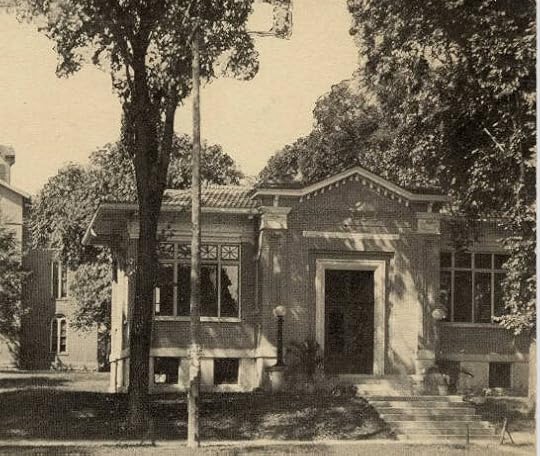
Libraries: more dangerous than they look.
In 8th grade I would occasionally be a substitute paper carrier for Cathy Allen, whose route was on the opposite side of town, and on my way home I'd stop by the library to get a drink of water and look at books. On one particular day, as I came out the front door, I thought it would be fun to jump over the bushes. I considered myself a good leaper. I was wrong on both accounts.
My foot caught in the bushes and I fell hard. Right onto a freshly trimmed branch--quarter inch in diameter or so, angled cut sticking up like a pungee stick. It punctured a hole about an inch deep in the top of my thigh and then ripped its way through the muscle as I tumbled over the bushes to the ground.
The minute I tried to stand up I knew I was hurt badly. There was blood everywhere. The gash in my leg was at least four inches long. It hurt as bad as anything I had ever felt. A smart kid would have gotten help.
I wasn't a smart kid.
Back into the library I went, in the side door, down to the basement bathroom. I propped my leg on the sink and ran cold water over the cut, packed it with paper towels, and when it wouldn't stop bleeding I took off one of my gym socks — think about that for a minute: a teenage boy's gym sock, that I'd been wearing all day, running around town to deliver papers — and knotted around my leg to stop the bleeding.
Then I walked home. A little bit less than a mile, but it felt like a death march. My leg throbbed with pain every single step.
At this point, a smart kid would have talked to his parents, gone to the Emergency Room, gotten some stitches and antibiotics.
I wasn't a smart kid.
No, I was scared to death of doctors and hospitals and things like needles and IVs ever since my first eye surgery at the age of 4. I wasn't going to go near them. So I locked myself in the bathroom, washed out the wound with soap and water — it was still bleeding, but not as badly — then I packed it with gauze and wrapped it up with first aid tape. So it all ended well.
Except it didn't. My leg still hurt. Within a couple days it was hot to the touch. I was running a fever. And the bandage was soaked with more than blood.
By the third day, my leg was swollen and I had red and white stripes running down my thigh and calf. It was infected.
This is where you'd think I'd finally ask for help.
You'd be wrong.
I selected tools. A finger nail file that I heated over the stove. A full bottle of rubbing alcohol that I soaked the file in after I heated it. Some gauze and bandages that I had bought at McCarthy's Pharmacy downtown.
I picked off the scab and right away I could that the infection was bad. I won't bother you by describing it. But trust me, you'd be bothered if I did. I proceeded to scrape it all out with the finger nail file. Over and over, debrising the wound, taking breaks only long enough to pour the rubbing alcohol in it. I quit when it was raw and bleeding and I was out of alcohol. Then I packed it up with gauze, wrapped it tight with bandages, and hoped for the best.
If you can't be smart, be lucky. I was lucky. The saying goes that God looks out for fools and children, and I was both.
My fever broke the next day. The swelling went down. The leg stopped aching so badly. Eventually the wound healed, and all I had to show for it was a big purple scar that looked like a red wriggler crossing my thigh and a story that always makes my children squirm in their seats.
[image error]
Like this, but without the sexy curl.
Looking back now, I know that infections are nothing to mess with. And neither are big deep wounds in your leg. I could have gotten really sick. I could have lost the leg. I could have died.
I could have died because of two things. I was afraid. I was afraid of hospitals, afraid of needles. A finger nail file? Sure. Needles? No way! And I didn't trust anyone. I thought I had to do everything by myself.
I remember always being afraid. As a kid, I was afraid of everything.
My stepfather Ted was an insurance claims adjustor. When I was about five years old, he took me along on some of his claims. Two of them stick out in my memory more than others. One was a car accident. If I remember the story correctly--and I may not, I was only five--a bunch of drunken teenagers crashed their mustang under a semi-truck, tearing the top off the car and killing them. While Ted spoke with the junkyard owner where the car had been towed, I wandered around, curious, and peered inside the wreckage. What I remember vividly is the blood.
Blood in tv shows and movies is always red, no matter how long ago it was spilled. But I hadn't seen those tv shows and movies, so I didn't know that. The dried blood in the car was brown. Like a scab. There were lines of it splattered on the seat-backs and doors, there were splashes of it on the seats, and there was a puddle of it on the floor under and around the beer bottles.
I call it a puddle, but it was more like a crust. There was a bottle cap on the floor, sticking edge up in the dried blood, and I remembering wondering, not understanding, how it got that way.
Second trip I remember with my stepdad was to the site of a house fire. No one had died, but the poor family's home was destroyed. The front half of the house looked like a mouth full of black and broken teeth that had vomited everything—a mattress, a broken TV, pieces of furniture, clothing, family pictures, children's toys—onto the front lawn. Most of it was charred and blackened and all of it was soaked from the fire hoses. The scent of it—the stale, burned, wet, melted plastic scent of it—is haunting. To this day, when I smell anything like it, I flash back to that.
When my stepdad stopped working as an adjustor a year or so later, he took a regular job working night shift at the juvenile detention center. One night a group of teenagers broke out of their rooms, beat him unconscious with a set of weights from the gym, stole his keys and his car and escaped. We went to visit him in the hospital, and I remember how his face was all bruised and bloody.
Like I said, I remember being afraid all the time.
We lived in a trailer park, used to be called Lewis Trailer Park, I don't know what it's called now. In 1971, less than a week before my 7th birthday, a storm hit Marysville. The newspaper called it a tornado, although I understand the National Weather Service never confirmed it. But it did a tornado's worth of damage. 
Not as exciting as the Wizard of Oz.
Our trailer wasn't touched, but big trees were blown down and trailers all around us were knocked off their foundations or even flipped over. 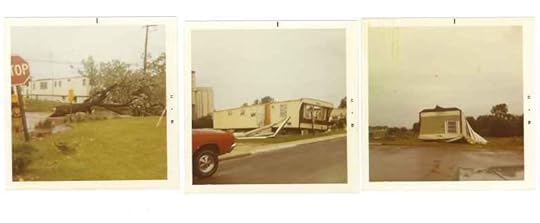
Trailers in the hands of an angry God.
One trailer I don't have a picture of, except in my memory. The roof had been peeled off, rolled back like the lid on a can of sardines. The front room of the trailer was the kitchen, and everything in it was destroyed. The cabinets were ripped apart and the contents scattered like confetti. The kitchen table and the chairs were tossed around like children's toys in a temper tantrum. In the whole kitchen only the refrigerator, the big heavy refrigerator, was unmoved.
Equally unmoved, sitting on top of the refrigerator, was a duck. It was a duck decoy or maybe a ceramic cookie jar shaped like a duck. But it sat there, untouched, like it had flown in and alighted safely after the storm was over.
Our trailer was unhurt, but the one down the street was flipped over. This trailer was destroyed, but the fake duck was unharmed. I had a strong sense at that moment that violence was random and unpredictable.
So I was afraid of the place where I lived. And a lot of the time I was afraid where I played.
It's hard to convey to kids today what it was like when I was young, 10, 11, 12 years old. There was no cable television, only three channels, and they stopped broadcasting over night. Video game choices were restricted to Pong. There was no internet, no video streaming, no DVDs. If you were a kid and you wanted something to do, you pretty much had to play outside. So we played outside in the ponds and woods and creek behind the trailers, what today is called, as I understand it, McCarthy Park. 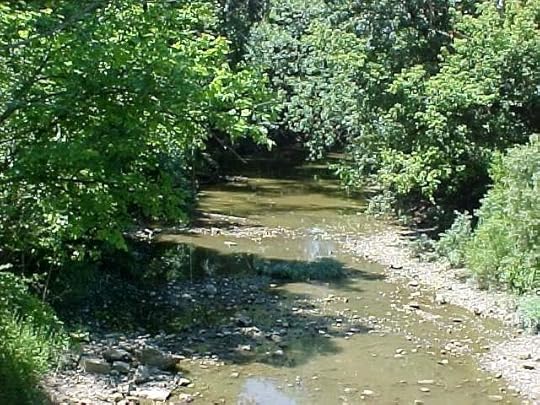
Shit Creek. No, really - the city's waste sewage treatment plant
was located next to the trailer park, just out of view of this shot.
We had a lot of good times in the woods, and it was absolutely essential to the formation of my imagination, but it wasn't without danger. There were the ordinary dangers like the huge snapping turtles under the bridge, which I avoided, or falling through the ice in the winter, which I didn't. When we played around the ponds, we learned to poke sticks through the weeds first so we could find and set off the muskrat traps. Leg traps, like bear traps, only if the bears were really small. We didn't want to accidentally step in them.
But there were other dangers. Like the time when my friend Jeff and I were maybe 11, and two guys thought it would be funny to jump out of the woods and chase us with an ax. We screamed and ran for the trailers, even after we heard them laughing behind us.
There were spots in the woods that were, and probably still are, a little hard to reach, isolated by the creek and the railroad tracks. It was probably the following year when we created a clearing in one of these places. We moved fallen trees out of the way to form a circle, cleared brush out of the center, stacked up all the rocks, and made a place where we could hang out. Then we promptly forgot about and went off to do other things for a while.
When we came back to the clearing weeks, or maybe even months later, we discovered that somebody else had been there. They'd built a fire pit and tossed empty beer cans everywhere, which was bad enough. But what was worst was they had filled the clearing with a whole crop of plants, which were just starting to get some size.
Looking back, it's easy to see that we had stumbled onto someone's marijuana farm. But we were clueless then. We were clueless and angry—somebody had taken our space, littered it with trash, and filled it up so we couldn't play there any more. So, in an effort to reclaim it, we started ripping up the plants.
Well the farmer wasn't too far from his crop. Probably in one of the run-down houses that backed up against the railroad tracks over on East 4th Street. We were just about done re-clearing the space when we heard furious shouting across the creek and saw a man with long hair and a rifle running toward us. It was the gun more than the hair that caught our attention. Especially when he aimed the gun and pulled the trigger.
You hear a bullet whiz over your head and it scares you. At least it scared us. Again, looking back, I don't think he was trying to shoot us, just scare us off, and so he shot over our heads on purpose. But we had no idea at the time. We ran all the way back to the trailers and decided he could have the clearing.
But we couldn't stay out of that park forever. Where else would we play? So the summer after 7th grade, I was with another one of my friends - I'm not going to name him because I don't know if he's ever told his version of this incident - down playing in the woods when two guys surprised us. One of them had a tire iron, looked ready to hit us with it. The other was swinging a length of bicycle chain. If we tried to run or get away, he whipped it at us. To this day, there's probably nothing that scares me as much as seeing a greasy length of bicycle chain swinging at someone.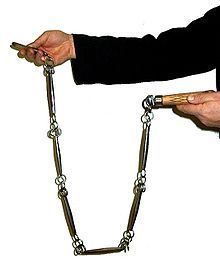
In use as a battlefield weapon since the Jin Dynasty in 265 A.D.
These guys were no older than us, I think maybe they were brothers or cousins. But they were bigger than us, the kind of kids we called hoods, regular smokers in middle school, always getting in fights. They made us march back into the woods, across the shallow water below the dam, into the dead zone between the creek and the railroad tracks. And all the way back there, they kept telling us how they were going to rape us and beat us up. How if we tried to get away they'd kill us.
I'm not quoting them because I honestly don't remember their words. I remember the tire iron. And the bicycle chain. How angry and frustrated they seemed. How they would snap at us but whisper to each other. How my heart thumped like a woodpecker drilling a tree.
The only thing my friend and I had going for us was we knew the woods better than they did, and we knew where there was a fallen tree across the deep part of the creek. So we kept talking and shifting away from them, letting them think they had us cornered, and then we turned and ran. We jumped up on the tree, ran across to the other side, and didn't stop running until we got back into town.
I promise I'll get back to the library and get back to the books here in a moment. The point is that I didn't feel safe where I lived. And I didn't feel safe where I played. But there was always school. School's a safe place, right?
Between kindergarten and sixth grade, we lived on the same street. Which was good, because I didn't always handle change well. But during that time, in a town of only 5,000 people, I went to this many different schools.
The new building wasn't finished when school started
so we started Kindergarten in the old church offices.

Good news: The new building was finished mid-year.
Bad news: The teacher yelled at me constantly for making messes.
I started having frequent nightmares.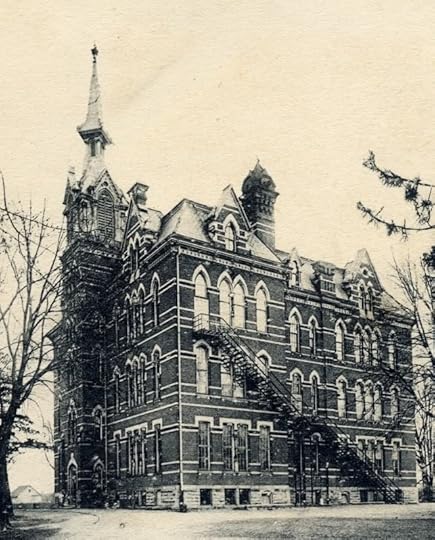
1st and 2nd Grade: Yes, it looks like Arkham Asylum.
During these two years, I had chicken pox, measles, german measles, mumps (twice)
and a bladder infection that put me in the hospital and made me miss a month of school.
No, I don't remember much school from those 2 years. Yes, I support vaccines. 
3rd Grade: Woo, they're going to build a new school!
Boo, my sister and I were bussed to this country school
while almost all our former classmates went to school in town.

The new building wasn't finished yet so we started
4th grade here with classes in the old gym.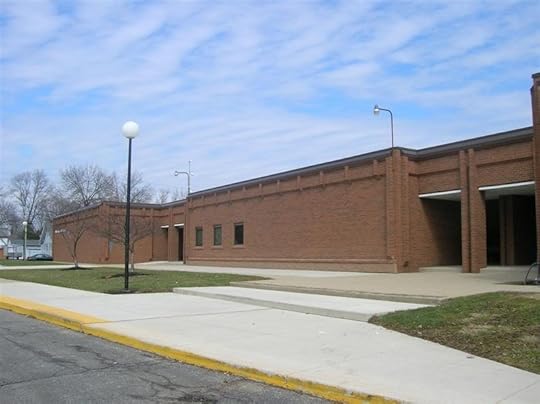
4th and 5th grades:
Yeah! Life doesn't seem so black and white any more.

6th grade: Back to Black-and-whites-ville.
The church and the city were building new elementary schools, so a lot of kids were in multiple buildings during that time. But I was in more than most for reasons that are still hard for me to explain. I had a few good friends, some of whom are still friends today, but one year I'd be in school with them, and the next year I wouldn't. I was a kid who didn't like change, and yet I was almost always the new kid, always starting over. And it made me the target of bullies.
Well, that's not entirely fair.
The coke bottle glasses and awkward nerdiness also made me a target of bullies. As did the fact that I could be a giant-sized dick. I was angry, I would argue, and I could be abrasive. If someone was even thinking about picking a fight with me, I had the bad habit of talking them into it. The fact is that during my elementary years, I ended up in a lot of fights. Some of them were pretty rough, and more than once I ended up with finger-mark bruises on my throat or even a broken collar bone.
So I was relieved when I got to middle school. There was only one middle school. No more changes!
Except I had another change.
After the first nine weeks of sixth grade, my teachers, who were excellent and who were trying to do me a favor, realized I was bright. Instead of the "vocational" track where trailer park kids usually ended up, they decided I belonged in the college prep track.
So my whole schedule changed. I was put in new classes with a group of kids I mostly didn't know, kids from the "good side" of town. And I was the only new kid moved into their classes.
Even so, things might have worked out okay except I had one teacher who wasn't happy to have me in class. After the first week or two, this teacher pulled me aside. They said, they had to have me in their class but they didn't like it. They knew I was a bad kid. They knew I smoked cigarettes (I didn't). That I was a bad influence (I may have been, I dunno). And this teacher — in particularly Snape-like fashion — stated explicitly that I didn't belong in a class with good kids, that I wasn't allowed to make friends with any them, and the teacher promised that they would be watching me.
I don't know if the teacher said anything to the other kids or if the kids just sensed an easy target, but I have to tell you, the rest of that year was hellish.
On the playground during recess and in gym class, I was always getting shoved and knocked down and punched and threatened by groups of boys. Then, when I would walk home, I had to worry about getting jumped by gangs of kids from the trailer park who were angry at me because I thought I was better than them. I was a dirty fighter, a scratcher, a biter, an eye-gouger. But that year was brutal.
And I couldn't tell my teachers, I couldn't tell any adults, because I didn't trust anyone.
So you have the general picture. There's a lot I've left out. Like the church trip to Colorado, where a bunch of us slid off a remote mountainside, some of us suffering broken bones and concussions while others got frostbite waiting for the helicopters to come airlift us out. Or when I worked at the local restaurant and my boss accidentally knocked an aerosol can in the deep fryer and it exploded in his face. In neither instance was I hurt, nor anyone permanently injured. But all in all it contributed to a constant sense of fear on my part and a lack of trust in adults.
I don't want to be unfair. There were good spots too: I had some great teachers especially in art and English, and in high school I joined the debate team which channeled my argumentative nature. But I was still afraid and awkward all the time. I felt like I had no one to turn to and no future ahead of me. I felt like I would never belong. I was sure that Marysville wanted me dead. The city hated me. It's no coincidence that whenever I write a horror story, it takes place in a small town in Ohio.
Remember the car wreck, the one I saw when I was five years old?
I remembered it too.
And then I got my driver's license.
So one day I was driving home along Main Street and I came to the railroad crossing next to the grain elevator. The warning lights were flashing but in those days there was no gate, nothing to keep you from going out on the tracks.
The train was moving fast. It was twice as big as a semi-truck and had 100 times the weight moving behind it. Anything that got hit by that train...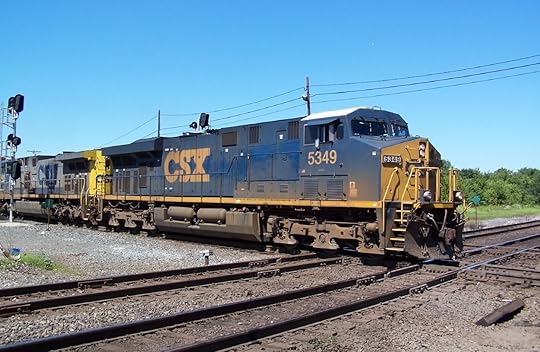
Roaring like an avalanche, coming down the mountain.
I thought, "This'll be painful but it'll be quick." Hell, it couldn't hurt any worse than pouring rubbing alcohol into an open leg wound.
So I pulled the car forward onto the tracks.
I made sure the driver's side door was lined up in the middle of the tracks. So I was looking right down the nose of that train.
The train engineer laid on the whistle. It was screaming at me to get off the tracks.
The driver in the car behind me starting honking his horn. As if I didn't see the train.
Well, I saw the train. All I had to do was brace myself for the impact.
Instead, I slammed my foot on the gas.
The car shot forward and the train was already whizzing past in my rearview mirror. It must have just missed me by feet. I was shaking so bad I could barely drive. It was months before I could drive across railroad tracks again. I used to go out of town and around the bypass just to avoid driving across them.
So why did I do it? Why did I hit the gas?
The library.
Libraries: much better than trains.
If there was one place I felt completely safe and at home, it was in the library. When I was immersed in a book, I was transported someplace far away from where I lived.
When I was small, I read Dr. Suess and other kids' books, but they made no lasting impression on me. I did not understand whimsy. But the summer I turned 10 years old I climbed, for the first time by myself, the steps out of the children's section in the basement and made my way up to adult fiction.
The old library had huge windows, and it was filled with light like a church, only better than a church because it felt lived in. The front of the library had shelves full of reference books and big oak tables where you could sit and read them. The librarian's counter was old, like a judge's bench. Past that, past the card catalog, was the fiction section. Rows of wooden shelves, dark with age and varnish, filled with books that smelled like… books. Musty. Full of mystery. Some of the best were the old Grosset & Dunlap hardcovers, with their crisp pages starting to yellow, and their faded red spines, worn and fraying at the edges, and the circulation cards tucked in back, stamped with dates, showing how many dozens or hundreds of times they had been checked out over the years.
I read Jaws that summer, and something about the inevitable violence of the shark spoke to me in a way far more profound than anything The Cat in The Hat ever said. But the real turning point for me was when I stumbled into the science fiction and fantasy collection.
I don't want to knock great literature, particularly the stuff we read in school. Some of those books have meant a lot to me. But think about the way most of those books end:
The Great Gatsby - he fails to make his dream of marrying Daisy a reality and then he gets murdered for someone else's infidelity.
Hamlet - he fails to prove for certain his father's fate and then he dies a horrible violent death, taking with him a bunch of innocent people as collateral damage.
The Stranger - Mersault fails to find anything meaningful about life, commits a senseless murder, and then is executed.
Romeo and Juliet - the young couple fails to escape their violent and dysfunctional families, and end up killing themselves.
Old Yeller - the dog dies. Let me repeat that for emphasis: the dog dies.
At least in Jaws Brody and company finally kill the shark!
But in fantasy and science fiction books I found even better perspective. No matter how bad I thought my situation was, no matter how afraid, no matter how unfair, the characters in these books had it worse than I did. Didn't like where I lived? Tarzan gets abandoned as a baby in the jungle and is raised by apes. I had it way better than that. Think there's an unsolvable problem? Isaac Asimov shrinks a submarine crew to go inside a guy's body to fix an unsolvable problem. Don't fit in? Neither did Paul Muad'Dib when he went to join the Fremen in Dune, and look what he accomplished. Think life is unfair? Lord of the Rings. Frodo doesn't want the One Ring, he didn't do anything to deserve that burden, and yet he's the one who has to take it all the way to Mount Doom to give Sauron the finger.
[image error]
You know what I mean.
Literary fiction is afraid of true heroes but genre fiction isn't. People are expected to rise above their problems and circumstance and make a difference in the world for other people. In fantasy and science fiction, nobody has to do things alone. They go get advice. They gather their friends and work as a team. They ask for help. Holy crap, if Hamlet had just read some science fiction that story could have turned out so much better for him!
Fantasy and science fiction novels changed my whole perspective about life and opportunities, not immediately, not all at once, but through a series of cumulative impressions, an offering of alternate models, absorbed and internalized over time. Without those novels I might have stared down that train and decided not to put my foot on the gas at the last instant.
The place I first discovered those books is the library.
And that's how the Marysville Public Library saved my life.
How the Marysville Public Library Saved My Life
(This is the talk I gave to the Friends of the Marysville Public Library on February 15, 2011, at the Veterans Auditorium.)
I promised to tell the story of how the Marysville Public Library saved my life, but first I want to tell the story about how the Marysville Public Library nearly killed me.
[image error]
Libraries: more dangerous than they look.
The Marysville Public Library of my childhood was a Carnegie Library built in 1910. It was a brick stump of a building, about as tall as it was thick. You had to climb two sets of steps to reach the main entrance. When I knew it, two rows of mature bushes flanked the stairs. If I recall correctly they were yews. They had a tendency to grow wild in every direction, but someone always kept them neatly trimmed.
In 8th grade I would occasionally be a substitute paper carrier for Cathy Allen, whose route was on the opposite side of town, and on my way home I’d stop by the library to get a drink of water and look at books. On one particular day, as I came out the front door, I thought it would be fun to jump over the bushes. I considered myself a good leaper. I was wrong on both accounts.
My foot caught in the bushes and I fell hard. Right onto a freshly trimmed branch--quarter inch in diameter or so, angled cut sticking up like a pungee stick. It punctured a hole about an inch deep in the top of my thigh and then ripped its way through the muscle as I tumbled over the bushes to the ground.
The minute I tried to stand up I knew I was hurt badly. There was blood everywhere. The gash in my leg was at least four inches long. It hurt as bad as anything I had ever felt. A smart kid would have gotten help.
I wasn’t a smart kid.
Back into the library I went, in the side door, down to the basement bathroom. I propped my leg on the sink and ran cold water over the cut, packed it with paper towels, and when it wouldn’t stop bleeding I took off one of my gym socks — think about that for a minute: a teenage boy’s gym sock, that I’d been wearing all day, running around town to deliver papers — and knotted around my leg to stop the bleeding.
Then I walked home. A little bit less than a mile, but it felt like a death march. My leg throbbed with pain every single step.
At this point, a smart kid would have talked to his parents, gone to the Emergency Room, gotten some stitches and antibiotics.
I wasn’t a smart kid.
No, I was scared to death of doctors and hospitals and things like needles and IVs ever since my first eye surgery at the age of 4. I wasn’t going to go near them. So I locked myself in the bathroom, washed out the wound with soap and water — it was still bleeding, but not as badly — then I packed it with gauze and wrapped it up with first aid tape. So it all ended well.
Except it didn’t. My leg still hurt. Within a couple days it was hot to the touch. I was running a fever. And the bandage was soaked with more than blood.
By the third day, my leg was swollen and I had red and white stripes running down my thigh and calf. It was infected.
This is where you’d think I’d finally ask for help.
You’d be wrong.
I selected tools. A finger nail file that I heated over the stove. A full bottle of rubbing alcohol that I soaked the file in after I heated it. Some gauze and bandages that I had bought at McCarthy’s Pharmacy downtown.
I picked off the scab and right away I could that the infection was bad. I won’t bother you by describing it. But trust me, you'd be bothered if I did. I proceeded to scrape it all out with the finger nail file. Over and over, debriding the wound, taking breaks only long enough to pour the rubbing alcohol in it. I quit when it was raw and bleeding and I was out of alcohol. Then I packed it up with gauze, wrapped it tight with bandages, and hoped for the best.
If you can’t be smart, be lucky. I was lucky. The saying goes that God looks out for fools and children, and I was both.
My fever broke the next day. The swelling went down. The leg stopped aching so badly. Eventually the wound healed, and all I had to show for it was a big purple scar that looked like a red wriggler crossing my thigh and a story that always makes my children squirm in their seats.
[image error]
Like this, but without the sexy curl.
Looking back now, I know that infections are nothing to mess with. And neither are big deep wounds in your leg. I could have gotten really sick. I could have lost the leg. I could have died.
I could have died because of two things. I was afraid. I was afraid of hospitals, afraid of needles. A finger nail file? Sure. Needles? No way! And I didn't trust anyone. I thought I had to do everything by myself.
I remember always being afraid. As a kid, I was afraid of everything.
My stepfather Ted was an insurance claims adjustor. When I was about five years old, he took me along on some of his claims. Two of them stick out in my memory more than others. One was a car accident. If I remember the story correctly--and I may not, I was only five--a bunch of drunken teenagers crashed their mustang under a semi-truck, tearing the top off the car and killing them. While Ted spoke with the junkyard owner where the car had been towed, I wandered around, curious, and peered inside the wreckage. What I remember vividly is the blood.
Blood in tv shows and movies is always red, no matter how long ago it was spilled. But I hadn’t seen those tv shows and movies, so I didn’t know that. The dried blood in the car was brown. Like a scab. There were lines of it splattered on the seat-backs and doors, there were splashes of it on the seats, and there was a puddle of it on the floor under and around the beer bottles.
I call it a puddle, but it was more like a crust. There was a bottle cap on the floor, sticking edge up in the dried blood, and I remembering wondering, not understanding, how it got that way.
Second trip I remember with my stepdad was to the site of a house fire. No one had died, but the poor family’s home was destroyed. The front half of the house looked like a mouth full of black and broken teeth that had vomited everything—a mattress, a broken TV, pieces of furniture, clothing, family pictures, children's toys—onto the front lawn. Most of it was charred and blackened and all of it was soaked from the fire hoses. The scent of it—the stale, burned, wet, melted plastic scent of it—is haunting. To this day, when I smell anything like it, I flash back to that.
When my stepdad stopped working as an adjustor a year or so later, he took a regular job working night shift at the juvenile detention center. One night a group of teenagers broke out of their rooms, beat him unconscious with a set of weights from the gym, stole his keys and his car and escaped. We went to visit him in the hospital, and I remember how his face was all bruised and bloody.
Like I said, I remember being afraid all the time.
We lived in a trailer park, used to be called Lewis Trailer Park, I don’t know what it’s called now. In 1971, less than a week before my 7th birthday, a storm hit Marysville. The newspaper called it a tornado, although I understand the National Weather Service never confirmed it. But it did a tornado’s worth of damage.
[image error]
Not as exciting as the Wizard of Oz.
Our trailer wasn't touched, but big trees were blown down and trailers all around us were knocked off their foundations or even flipped over.
[image error]
Trailers in the hands of an angry God.
One trailer I don’t have a picture of, except in my memory. The roof had been peeled off, rolled back like the lid on a can of sardines. The front room of the trailer was the kitchen, and everything in it was destroyed. The cabinets were ripped apart and the contents scattered like confetti. The kitchen table and the chairs were tossed around like children’s toys in a temper tantrum. In the whole kitchen only the refrigerator, the big heavy refrigerator, was unmoved.
Equally unmoved, sitting on top of the refrigerator, was a duck. It was a duck decoy or maybe a ceramic cookie jar shaped like a duck. But it sat there, untouched, like it had flown in and alighted safely after the storm was over.
Our trailer was unhurt, but the one down the street was flipped over. This trailer was destroyed, but the fake duck was unharmed. I had a strong sense at that moment that violence was random and unpredictable.
So I was afraid of the place where I lived. And a lot of the time I was afraid where I played.
It’s hard to convey to kids today what it was like when I was young, 10, 11, 12 years old. There was no cable television, only three channels, and they stopped broadcasting over night. Video game choices were restricted to Pong. There was no internet, no video streaming, no DVDs. If you were a kid and you wanted something to do, you pretty much had to play outside. So we played outside in the ponds and woods and creek behind the trailers, what today is called, as I understand it, McCarthy Park.
[image error]
Shit Creek. No, really - the city's waste sewage treatment plant
was located next to the trailer park, just out of view of this shot.
We had a lot of good times in the woods, and it was absolutely essential to the formation of my imagination, but it wasn't without danger. There were the ordinary dangers like the huge snapping turtles under the bridge, which I avoided, or falling through the ice in the winter, which I didn't. When we played around the ponds, we learned to poke sticks through the weeds first so we could find and set off the muskrat traps. Leg traps, like bear traps, only if the bears were really small. We didn’t want to accidentally step in them.
But there were other dangers. Like the time when my friend Jeff and I were maybe 11, and two guys thought it would be funny to jump out of the woods and chase us with an ax. We screamed and ran for the trailers, even after we heard them laughing behind us.
There were spots in the woods that were, and probably still are, a little hard to reach, isolated by the creek and the railroad tracks. It was probably the following year when we created a clearing in one of these places. We moved fallen trees out of the way to form a circle, cleared brush out of the center, stacked up all the rocks, and made a place where we could hang out. Then we promptly forgot about and went off to do other things for a while.
When we came back to the clearing weeks, or maybe even months later, we discovered that somebody else had been there. They’d built a fire pit and tossed empty beer cans everywhere, which was bad enough. But what was worst was they had filled the clearing with a whole crop of plants, which were just starting to get some size.
Looking back, it's easy to see that we had stumbled onto someone’s marijuana farm. But we were clueless then. We were clueless and angry—somebody had taken our space, littered it with trash, and filled it up so we couldn't play there any more. So, in an effort to reclaim it, we started ripping up the plants.
Well the farmer wasn’t too far from his crop. Probably in one of the run-down houses that backed up against the railroad tracks over on East 4th Street. We were just about done re-clearing the space when we heard furious shouting across the creek and saw a man with long hair and a rifle running toward us. It was the gun more than the hair that caught our attention. Especially when he aimed the gun and pulled the trigger.
You hear a bullet whiz over your head and it scares you. At least it scared us. Again, looking back, I don’t think he was trying to shoot us, just scare us off, and so he shot over our heads on purpose. But we had no idea at the time. We ran all the way back to the trailers and decided he could have the clearing.
But we couldn’t stay out of that park forever. Where else would we play? So the summer after 7th grade, I was with another one of my friends - I'm not going to name him because I don't know if he's ever told his version of this incident - down playing in the woods when two guys surprised us. One of them had a tire iron, looked ready to hit us with it. The other was swinging a length of bicycle chain. If we tried to run or get away, he whipped it at us. To this day, there’s probably nothing that scares me as much as seeing a greasy length of bicycle chain swinging at someone.
[image error]
In use as a battlefield weapon since the Jin Dynasty in 265 A.D.
These guys were no older than us, I think maybe they were brothers or cousins. But they were bigger than us, the kind of kids we called hoods, regular smokers in middle school, always getting in fights. They made us march back into the woods, across the shallow water below the dam, into the dead zone between the creek and the railroad tracks. And all the way back there, they kept telling us how they were going to rape us and beat us up. How if we tried to get away they’d kill us.
I'm not quoting them because I honestly don’t remember their words. I remember the tire iron. And the bicycle chain. How angry and frustrated they seemed. How they would snap at us but whisper to each other. How my heart thumped like a woodpecker drilling a tree.
The only thing my friend and I had going for us was we knew the woods better than they did, and we knew where there was a fallen tree across the deep part of the creek. So we kept talking and shifting away from them, letting them think they had us cornered, and then we turned and ran. We jumped up on the tree, ran across to the other side, and didn’t stop running until we got back into town.
I promise I’ll get back to the library and get back to the books here in a moment. The point is that I didn’t feel safe where I lived. And I didn’t feel safe where I played. But there was always school. School’s a safe place, right?
Between kindergarten and sixth grade, we lived on the same street. Which was good, because I didn't always handle change well. But during that time, in a town of only 5,000 people, I went to this many different schools.
[image error]
The new building wasn't finished when school started
so we started Kindergarten in the old church offices.
[image error]
Good news: The new building was finished mid-year.
Bad news: The teacher yelled at me constantly for making messes.
I started having frequent nightmares.
[image error]
1st and 2nd Grade: Yes, it looks like Arkham Asylum.
During these two years, I had chicken pox, measles, german measles, mumps (twice)
and a bladder infection that put me in the hospital and made me miss a month of school.
No, I don't remember much school from those 2 years. Yes, I support vaccines.
[image error]
3rd Grade: Woo, they're going to build a new school!
Boo, my sister and I were bussed to this country school
while almost all our former classmates went to school in town.
[image error]
The new building wasn't finished yet so we started
4th grade here with classes in the old gym.
[image error]
4th and 5th grades:
Yeah! Life doesn't seem so black and white any more.
[image error]
6th grade: Back to Black-and-whites-ville.
The church and the city were building new elementary schools, so a lot of kids were in multiple buildings during that time. But I was in more than most for reasons that are still hard for me to explain. I had a few good friends, some of whom are still friends today, but one year I’d be in school with them, and the next year I wouldn’t. I was a kid who didn't like change, and yet I was almost always the new kid, always starting over. And it made me the target of bullies.
Well, that’s not entirely fair.
The coke bottle glasses and awkward nerdiness also made me a target of bullies. As did the fact that I could be a giant-sized dick. I was angry, I would argue, and I could be abrasive. If someone was even thinking about picking a fight with me, I had the bad habit of talking them into it. The fact is that during my elementary years, I ended up in a lot of fights. Some of them were pretty rough, and more than once I ended up with finger-mark bruises on my throat or even a broken collar bone.
So I was relieved when I got to middle school. There was only one middle school. No more changes!
Except I had another change.
After the first nine weeks of sixth grade, my teachers, who were excellent and who were trying to do me a favor, realized I was bright. Instead of the “vocational” track where trailer park kids usually ended up, they decided I belonged in the college prep track.
So my whole schedule changed. I was put in new classes with a group of kids I mostly didn't know, kids from the "good side" of town. And I was the only new kid moved into their classes.
Even so, things might have worked out okay except I had one teacher who wasn’t happy to have me in class. After the first week or two, this teacher pulled me aside. They said, they had to have me in their class but they didn’t like it. They knew I was a bad kid. They knew I smoked cigarettes (I didn't). That I was a bad influence (I may have been, I dunno). And this teacher — in particularly Snape-like fashion — stated explicitly that I didn’t belong in a class with good kids, that I wasn’t allowed to make friends with any them, and the teacher promised that they would be watching me.
I don’t know if the teacher said anything to the other kids or if the kids just sensed an easy target, but I have to tell you, the rest of that year was hellish.
On the playground during recess and in gym class, I was always getting shoved and knocked down and punched and threatened by groups of boys. Then, when I would walk home, I had to worry about getting jumped by gangs of kids from the trailer park who were angry at me because I thought I was better than them. I was a dirty fighter, a scratcher, a biter, an eye-gouger. But that year was brutal.
And I couldn’t tell my teachers, I couldn’t tell any adults, because I didn’t trust anyone.
So you have the general picture. There's a lot I've left out. Like the church trip to Colorado, where a bunch of us slid off a remote mountainside, some of us suffering broken bones and concussions while others got frostbite waiting for the helicopters to come airlift us out. Or when I worked at the local restaurant and my boss accidentally knocked an aerosol can in the deep fryer and it exploded in his face. In neither instance was I hurt, nor anyone permanently injured. But all in all it contributed to a constant sense of fear on my part and a lack of trust in adults.
I don't want to be unfair. There were good spots too: I had some great teachers especially in art and English, and in high school I joined the debate team which channeled my argumentative nature. But I was still afraid and awkward all the time. I felt like I had no one to turn to and no future ahead of me. I felt like I would never belong. I was sure that Marysville wanted me dead. The city hated me. It’s no coincidence that whenever I write a horror story, it takes place in a small town in Ohio.
Remember the car wreck, the one I saw when I was five years old?
I remembered it too.
And then I got my driver’s license.
So one day I was driving home along Main Street and I came to the railroad crossing next to the grain elevator. The warning lights were flashing but in those days there was no gate, nothing to keep you from going out on the tracks.
The train was moving fast. It was twice as big as a semi-truck and had 100 times the weight moving behind it. Anything that got hit by that train...
[image error]
Roaring like an avalanche, coming down the mountain.
I thought, "This'll be painful but it'll be quick." Hell, it couldn’t hurt any worse than pouring rubbing alcohol into an open leg wound.
So I pulled the car forward onto the tracks.
I made sure the driver’s side door was lined up in the middle of the tracks. So I was looking right down the nose of that train.
The train engineer laid on the whistle. It was screaming at me to get off the tracks.
The driver in the car behind me starting honking his horn. As if I didn’t see the train.
Well, I saw the train. All I had to do was brace myself for the impact.
Instead, I slammed my foot on the gas.
The car shot forward and the train was already whizzing past in my rearview mirror. It must have just missed me by feet. I was shaking so bad I could barely drive. It was months before I could drive across railroad tracks again. I used to go out of town and around the bypass just to avoid driving across them.
So why did I do it? Why did I hit the gas?
The library.
[image error]
Libraries: much better than trains.
If there was one place I felt completely safe and at home, it was in the library. When I was immersed in a book, I was transported someplace far away from where I lived.
When I was small, I read Dr. Suess and other kids’ books, but they made no lasting impression on me. I did not understand whimsy. But the summer I turned 10 years old I climbed, for the first time by myself, the steps out of the children’s section in the basement and made my way up to adult fiction.
The old library had huge windows, and it was filled with light like a church, only better than a church because it felt lived in. The front of the library had shelves full of reference books and big oak tables where you could sit and read them. The librarian’s counter was old, like a judge’s bench. Past that, past the card catalog, was the fiction section. Rows of wooden shelves, dark with age and varnish, filled with books that smelled like… books. Musty. Full of mystery. Some of the best were the old Grosset & Dunlap hardcovers, with their crisp pages starting to yellow, and their faded red spines, worn and fraying at the edges, and the circulation cards tucked in back, stamped with dates, showing how many dozens or hundreds of times they had been checked out over the years.
I read Jaws that summer, and something about the inevitable violence of the shark spoke to me in a way far more profound than anything The Cat in The Hat ever said. But the real turning point for me was when I stumbled into the science fiction and fantasy collection.
I don’t want to knock great literature, particularly the stuff we read in school. Some of those books have meant a lot to me. But think about the way most of those books end:
The Great Gatsby - he fails to make his dream of marrying Daisy a reality and then he gets murdered for someone else’s infidelity.
Hamlet - he fails to prove for certain his father’s fate and then he dies a horrible violent death, taking with him a bunch of innocent people as collateral damage.
The Stranger - Mersault fails to find anything meaningful about life, commits a senseless murder, and then is executed.
Romeo and Juliet - the young couple fails to escape their violent and dysfunctional families, and end up killing themselves.
Old Yeller - the dog dies. Let me repeat that for emphasis: the dog dies.
At least in Jaws Brody and company finally kill the shark!
But in fantasy and science fiction books I found even better perspective. No matter how bad I thought my situation was, no matter how afraid, no matter how unfair, the characters in these books had it worse than I did. Didn’t like where I lived? Tarzan gets abandoned as a baby in the jungle and is raised by apes. I had it way better than that. Think there’s an unsolvable problem? Isaac Asimov shrinks a submarine crew to go inside a guy’s body to fix an unsolvable problem. Don’t fit in? Neither did Paul Muad'Dib when he went to join the Fremen in Dune, and look what he accomplished. Think life is unfair? Lord of the Rings. Frodo doesn’t want the One Ring, he didn’t do anything to deserve that burden, and yet he’s the one who has to take it all the way to Mount Doom to give Sauron the finger.
[image error]
You know what I mean.
Literary fiction is afraid of true heroes but genre fiction isn’t. People are expected to rise above their problems and circumstance and make a difference in the world for other people. In fantasy and science fiction, nobody has to do things alone. They go get advice. They gather their friends and work as a team. They ask for help. Holy crap, if Hamlet had just read some science fiction that story could have turned out so much better for him!
Fantasy and science fiction novels changed my whole perspective about life and opportunities, not immediately, not all at once, but through a series of cumulative impressions, an offering of alternate models, absorbed and internalized over time. Without those novels I might have stared down that train and decided not to put my foot on the gas at the last instant.
The place I first discovered those books is the library.
And that’s how the Marysville Public Library saved my life.
February 5, 2011
Five Football Teams That Need New Mascots
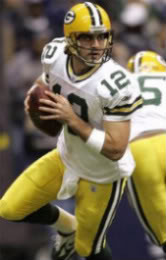
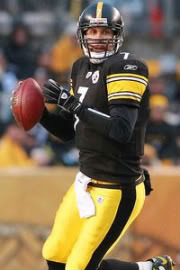
On Sunday the Green Bay Packers meet the Pittsburgh Steelers for SuperBowl XLV in an epic match-up of obsolete rustbelt mascots. Packers? Steelers? Let's face facts: these days in Green Bay the football team employs more people than the packing industry, and there isn't a single steel mill left in the city of Pittsburgh.
It's the 21st century, baby! So what would happen if we renamed sports teams to reflect the industries and personalities of their cities today?
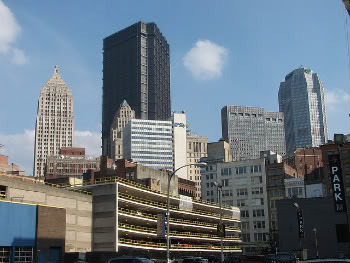
The Pittsburgh Healthcare Workers.
When they get injured they treat themselves.
5. The Seattle Frappuccinos
Number of seahawks in Washington state: About 1,000
Number of coffee shops in Seattle: About 10,000

"I'll have a fish latte' please."
Everyone has heard of "Seattle's Best Coffee" – has anyone ever heard the phrase "Seattle's Best Seabirds"? I don't think so. Caffeine is a ubiquitous stimulant, a daily part of our lives. It can be scalding hot. It has bite. And Seattle's Starbucks Coffee is a ruthless competitor, expanding into other cities and crushing the local coffee competition.
What caffeinated beverage is more emblematic of coffee's toughness than the frappuccino? Thirty years ago we had never heard of frappuccinos. Now, thanks to Seattle's most famous roaster, they dominate the American landscape. Just like your football team will dominate the league, Seattle. Think about it.
Other names to consider: The Seattle Barristas, The Seattle Jitters
4. The New York Commuters
Both the Jets and the Giants play in the Meadowlands… which is in NEW JERSEY. Like many self-indentifying New Yorkers, these football teams are "from" the city but can only afford to live elsewhere. The truth is, no figure is more iconic, no one better represents New York, than the commuter. Dedicated, fearless, willing to endure pain and discomfort, committed to long hours.
Choose the commuter as your mascot and it opens up a whole new world of metaphors. The O-Line is packed tighter than the rush hour L Train. A desperate quarterback is calling audibles like someone hailing a taxi in the rain.

Shonn Greene demonstrates his new
nickname, "The Subway."
Other names to consider: The New Jersey New Yorkers, The Fighting Giuliannis
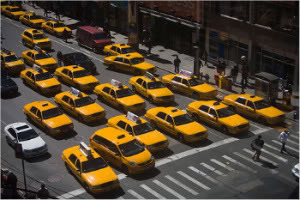
The New York City Cabbies.
Think of the awesome yellow uniforms.
3. The Kansas City Tweakers
Chiefs are so 1800s. How many people today have seen a real live chief? It's not the intimidating image that it once was.
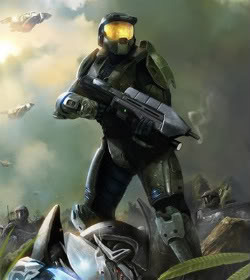
If they were the Kansas City Master Chiefs
that would be different.
Modern America is all about entrepreneurship. It's about the little guy creating his own business, defying the authorities and naysayers, and making his own success. Right? Right. And nothing says rugged individualism like the meth lab. So it's no surprise that Missouri, the heartland of America, leads the nation in meth labs. Frankly, it's not even close.
Meth has strong positive associations with speed, with exacting attention to little details, with high energy, and with violence – all things that we admire in football teams! The Kansas City Tweakers would be a celebration of local industry, the American spirit, and the essence of great football.
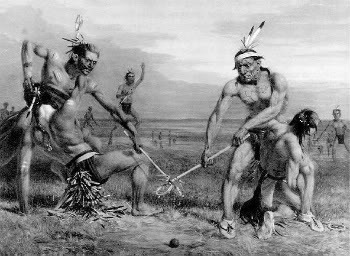
Historically, Native Americans are known
for playing lacrosse and slots.
Other names to consider: The Kansas City DEA Agents, The Kansas City Steaks
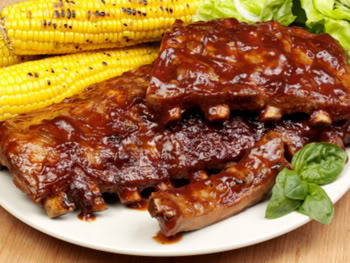
Or maybe the Kansas City BBQs.
Sure, it doesn't make any sense
but we love Kansas City BBQ.
2. The Buffalo Bill Collectors
Buffalo is one of those old manufacturing cities like Green Bay or Pittsburgh that wears its rustbelt with all the pride of a prize-winning professional wrestler. But Buffalo's mascot--a guy named Bill--is an older ideal than the Packers or Steelers.
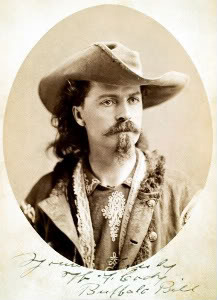
e.e. cummings wrote a famous poem
titled "Buffalo Bill's defunct" - I think that means
Bill wore pimpin' outfits.
Everyone knows the old industry is gone, but few people know that the new booming business in Buffalo is debt collection. Bill collectors are a perfect mascot for football. They're relentless in pursuit. They resort to all kinds of tricks and stunts to confuse opponents and make them drop their guard. They never quit. Bill collectors are known for their toughness, their ruthlessness, and their take-no-prisoners attitude.
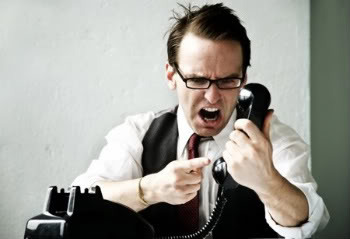
"We don't take prisoners
but we will take all your cash."
If you're still not persuaded, Buffalo, then consider this: are more people afraid of bills or bill collectors? Yeah, that's what I thought.
Other names to consider: The Buffalo Foreclosures, The Buffalo Check Cashers
1. The Cleveland Browns
Yes, yes, they're called the Browns already. But that's in honor of the legendary Paul Brown, the team's first coach.
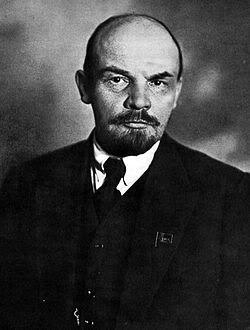
In baseball, Cincinnati named its team "The Reds"
to honor their first coach, Vladimir Lenin.
Let's go back to basics with the word brown. Because brown is the color of empty lots and boarded-up factories. Brown is the color of the snow in Cleveland after it's been on the ground half a day. Brown is the color of the Cuyahoga River as it flows into Lake Erie. Is there any city in America that's more brown than Cleveland?

Brownsville, Texas is a light tan.
Brown is the beater Chevy pick-up parked on your sidewalk. Brown is the guy with a shovel working down in the mud. Brown is a junkyard dog. What can Brown do for you? Brown can kick your motherfucking ass, motherfucker. That's what Brown can do for you.
Other names to consider: The Cleveland Shits, The Cleveland Drifters
According to this unofficial tourism video
Cleveland leads the nation in drifters.
I don't pretend this is a complete list, so feel free to make your own suggestions in the comments.
Five Football Teams That Need New Mascots
On Sunday the Green Bay Packers meet the Pittsburgh Steelers for SuperBowl XLV in an epic match-up of obsolete rustbelt mascots. Packers? Steelers? Let’s face facts: these days in Green Bay the football team employs more people than the packing industry, and there isn’t a single steel mill left in the city of Pittsburgh.
It’s the 21st century, baby! So what would happen if we renamed sports teams to reflect the industries and personalities of their cities today?
[image error]
The Pittsburgh Healthcare Workers.
When they get injured they treat themselves.
5. The Seattle Frappuccinos
Number of seahawks in Washington state: About 1,000
Number of coffee shops in Seattle: About 10,000
[image error]
"I’ll have a fish latte’ please."
Everyone has heard of “Seattle’s Best Coffee” – has anyone ever heard the phrase “Seattle’s Best Seabirds”? I don’t think so. Caffeine is a ubiquitous stimulant, a daily part of our lives. It can be scalding hot. It has bite. And Seattle's Starbucks Coffee is a ruthless competitor, expanding into other cities and crushing the local coffee competition.
What caffeinated beverage is more emblematic of coffee’s toughness than the frappuccino? Thirty years ago we had never heard of frappuccinos. Now, thanks to Seattle’s most famous roaster, they dominate the American landscape. Just like your football team will dominate the league, Seattle. Think about it.
Other names to consider: The Seattle Barristas, The Seattle Jitters
4. The New York Commuters
Both the Jets and the Giants play in the Meadowlands… which is in NEW JERSEY. Like many self-indentifying New Yorkers, these football teams are “from” the city but can only afford to live elsewhere. The truth is, no figure is more iconic, no one better represents New York, than the commuter. Dedicated, fearless, willing to endure pain and discomfort, committed to long hours.
Choose the commuter as your mascot and it opens up a whole new world of metaphors. The O-Line is packed tighter than the rush hour L Train. A desperate quarterback is calling audibles like someone hailing a taxi in the rain.
[image error]
Shonn Greene demonstrates his new
nickname, "The Subway."
Other names to consider: The New Jersey New Yorkers, The Fighting Giuliannis
[image error]
The New York City Cabbies.
Think of the awesome yellow uniforms.
3. The Kansas City Tweakers
Chiefs are so 1800s. How many people today have seen a real live chief? It's not the intimidating image that it once was.
[image error]
If they were the Kansas City Master Chiefs
that would be different.
Modern America is all about entrepreneurship. It’s about the little guy creating his own business, defying the authorities and naysayers, and making his own success. Right? Right. And nothing says rugged individualism like the meth lab. So it’s no surprise that Missouri, the heartland of America, leads the nation in meth labs. Frankly, it’s not even close.
Meth has strong positive associations with speed, with exacting attention to little details, with high energy, and with violence – all things that we admire in football teams! The Kansas City Tweakers would be a celebration of local industry, the American spirit, and the essence of great football.
[image error]
Historically, Native Americans are known
for playing lacrosse and slots.
Other names to consider: The Kansas City DEA Agents, The Kansas City Steaks
[image error]
Or maybe the Kansas City BBQs.
Sure, it doesn’t make any sense
but we love Kansas City BBQ.
2. The Buffalo Bill Collectors
Buffalo is one of those old manufacturing cities like Green Bay or Pittsburgh that wears its rustbelt with all the pride of a prize-winning professional wrestler. But Buffalo’s mascot--a guy named Bill--is an older ideal than the Packers or Steelers.
[image error]
e.e. cummings wrote a famous poem
titled “Buffalo Bill’s defunct” because
Bill wore funky pimpin' outfits.
Everyone knows the old industry is gone, but few people know that the new booming business in Buffalo is debt collection. Bill collectors are a perfect mascot for football. They’re relentless in pursuit. They resort to all kinds of tricks and stunts to confuse opponents and make them drop their guard. They never quit. Bill collectors are known for their toughness, their ruthlessness, and their take-no-prisoners attitude.
[image error]
"We don’t take prisoners
but we will take all your cash."
If you’re still not persuaded, Buffalo, then consider this: are more people afraid of bills or bill collectors? Yeah, that's what I thought.
Other names to consider: The Buffalo Foreclosures, The Buffalo Check Cashers
1. The Cleveland Browns
Yes, yes, they’re called the Browns already. But that's in honor of the legendary Paul Brown, the team's first coach.
[image error]
In baseball, Cincinnati named its team “The Reds”
to honor their first coach, Vladimir Lenin.
Let's go back to basics with the word brown. Because brown is the color of empty lots and boarded-up factories. Brown is the color of the snow in Cleveland after it’s been on the ground half a day. Brown is the color of the Cuyahoga River as it flows into Lake Erie. Is there any city in America that’s more brown than Cleveland?
[image error]
Brownsville, Texas is a light tan.
Brown is the beater Chevy pick-up parked on your sidewalk. Brown is the guy with a shovel working down in the mud. Brown is a junkyard dog. What can Brown do for you? Brown can kick your motherfucking ass, motherfucker. That’s what Brown can do for you.
Other names to consider: The Cleveland Shits, The Cleveland Drifters
According to this unofficial tourism video
Cleveland leads the nation in drifters.
I don't pretend this is a complete list, so feel free to make your own suggestions in the comments.
February 1, 2011
"Calvin!"

The steel sculpture in an Ellifritt Structure, which is used at colleges to demonstrate the different ways that steel beams can be connected. And snowmen abused.
(Tip of the hat to the Chronicle of Higher Education for the link. The Chronicle snagged it from The Daily What.)
"Calvin!"
The steel sculpture in an Ellifritt Structure, which is used at colleges to demonstrate the different ways that steel beams can be connected. And snowmen abused.
(Tip of the hat to the Chronicle of Higher Education for the link. The Chronicle snagged it from The Daily What.)
January 5, 2011
How The Marysville Public Library Saved My Life
The topic of my talk will be "How The Marysville Public Library Saved My Life." No, seriously, the Marysville Public Library saved my life! How many visiting authors in the series can say that? I'm betting on just one.
In the process, I'll also be talking about history and books and writing sorts of things.
My 30-45 minute talk will be followed by a 15-30 minute Question & Answer session. Afterwards, the library will be selling copies of my books and I'll stick around to sign them. If I'm lucky, maybe I'll catch up with some people I haven't seen in a while. The event will help raise money to support the Marysville Public Library.
Here are the details:
Date: Tuesday, February 15, 2011
Time: 6:45—9:00PM
Location:
Veteran's Memorial AuditoriumHope to see you there!
233 W. 6th Street
Marysville, OH 43040



